|
NATIVE PLANTS FOR BIRDS: WILD POINSETTIA
To help you create bird friendly habitat in your landscape, we are sharing a native plant every month that is beneficial to birds and pollinators.
This month's plant is:
Wild Poinsettia (Poinsettia cyathophora)
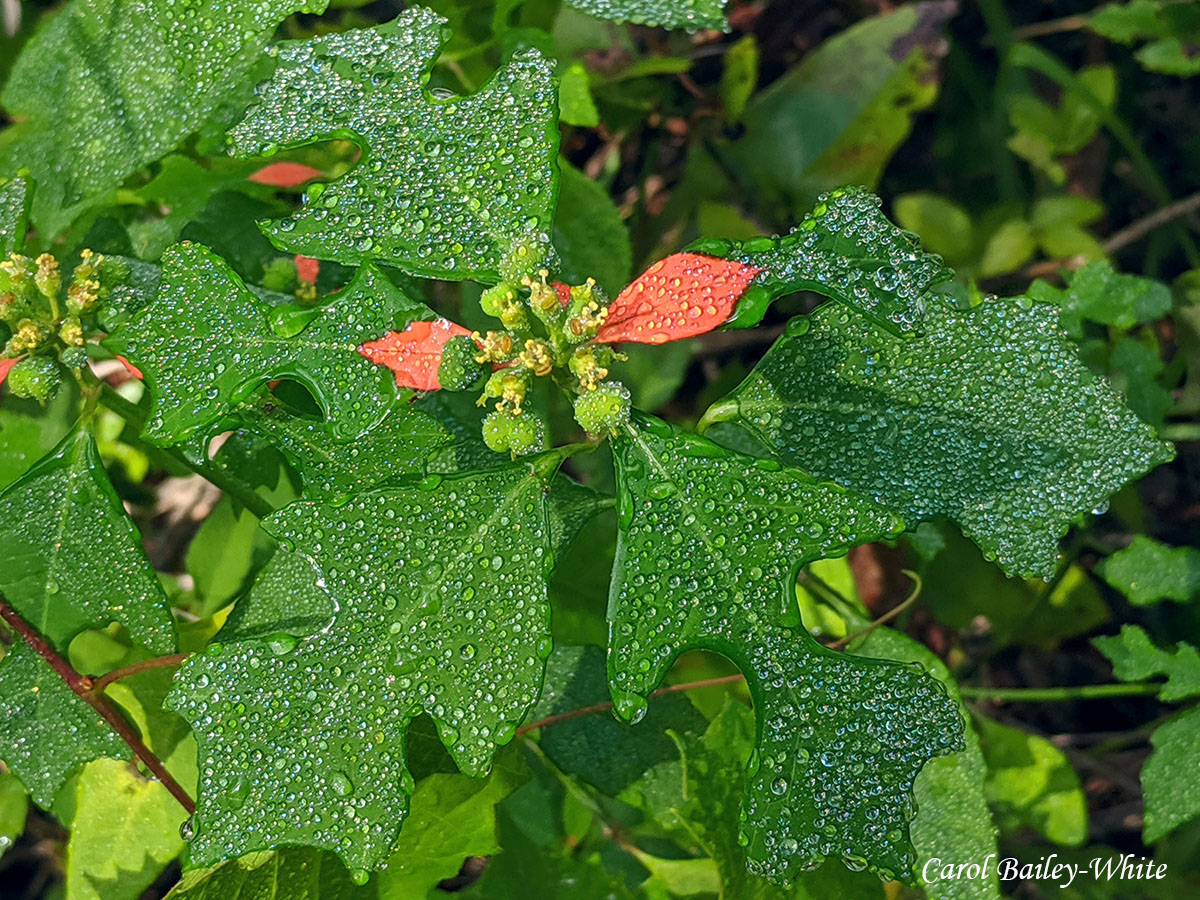 Wild poinsettia is a native plant which grows in scattered locations from Florida to California, north to Virginia and across to Minnesota in the Midwest. It has many names, including painted leaf, fire on the mountain, painted spurge, and summer poinsettia among them. It is a relative of the showy Mexican poinsettia which everyone uses at Christmastime. The Mexican poinsettia was first brought to the United States by Joel Poinsett, U.S. Ambassador to Mexico from 1825-1829 as he admired the red and green plant. The rest is history. Wild poinsettia is a native plant which grows in scattered locations from Florida to California, north to Virginia and across to Minnesota in the Midwest. It has many names, including painted leaf, fire on the mountain, painted spurge, and summer poinsettia among them. It is a relative of the showy Mexican poinsettia which everyone uses at Christmastime. The Mexican poinsettia was first brought to the United States by Joel Poinsett, U.S. Ambassador to Mexico from 1825-1829 as he admired the red and green plant. The rest is history.
The wild poinsettia is an erect annual or short-lived perennial which grows 1-2 feet tall. It will grow in full sun to part shade with average moisture. Once established, it will tolerate considerable drought and maintains itself by self-sown seeds. Due to its ease of growth, long flowering season (autumn in North Florida and year round in South Florida), it is a welcome addition to native plant gardens. Please note that like the Mexican poinsettia, it is poisonous so be careful if you have small children or pets who might try to taste it.
It attracts butterflies such as the White Peacock; bees will drink the nectar from its tiny flowers, and the seeds are a great favorite of Mourning Doves.
For additional information on native plants for birds, check out Audubon's excellent Plants for Birds website: Audubon.org/plantsforbirds.
For local sources of native plants, check with the Ixia Chapter of the Florida Native Plant Society. They often have native plants as well as cuttings available at their monthly meetings on the first Tuesday of each month. Check out their Events Calendar for all of their upcoming activities.
--Jody Willis, President
DUVAL AUDUBON COMMUNITY OUTREACH
In addition to our ambitious field trips and monthly programs schedule, Duval Audubon Society volunteers are active in our community, fulfilling our mission of "connecting people with nature" whenever and wherever our busy schedule allows. Here are some of our recent community outreach activities:
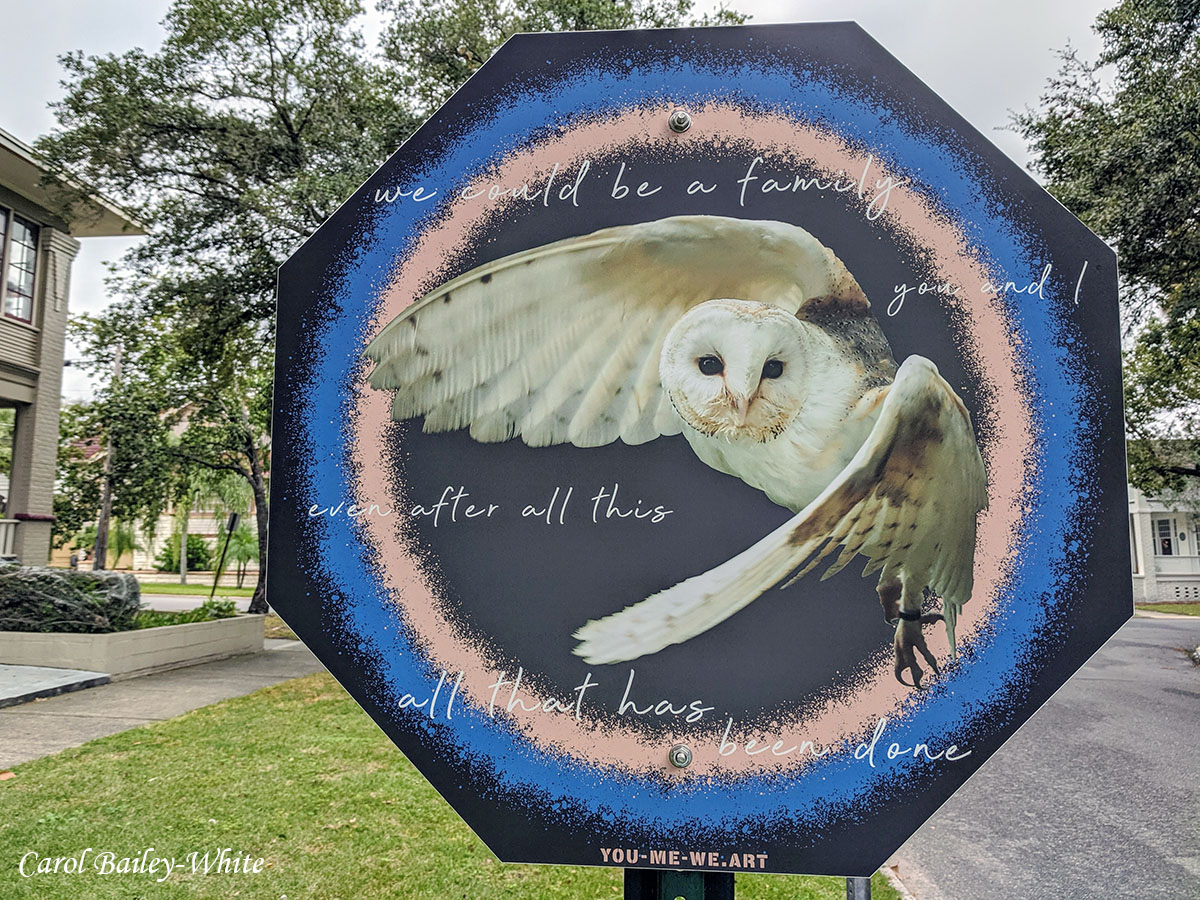 This fall we sponsored a bird-focused art installation and informational kiosk at Women Writing for (a) Change, Jacksonville, and led two urban bird walks for their group in the Riverside area in conjunction with their BIRDS art show and community conversation events. Their mission is "to nurture and celebrate the individual voice by facilitating supportive writing circles and by encouraging people to craft more conscious lives through the art of writing and the practices of community." This fall we sponsored a bird-focused art installation and informational kiosk at Women Writing for (a) Change, Jacksonville, and led two urban bird walks for their group in the Riverside area in conjunction with their BIRDS art show and community conversation events. Their mission is "to nurture and celebrate the individual voice by facilitating supportive writing circles and by encouraging people to craft more conscious lives through the art of writing and the practices of community."
We also gave our "Birding for Beginners" presentation to Groundwork Jacksonville's CREST (Community Restoration Environmental Stewardship Training) program participants and led a wonderful bird walk for the group at McCoys Creek near Hollybrook Park. Seventeen program participants learned 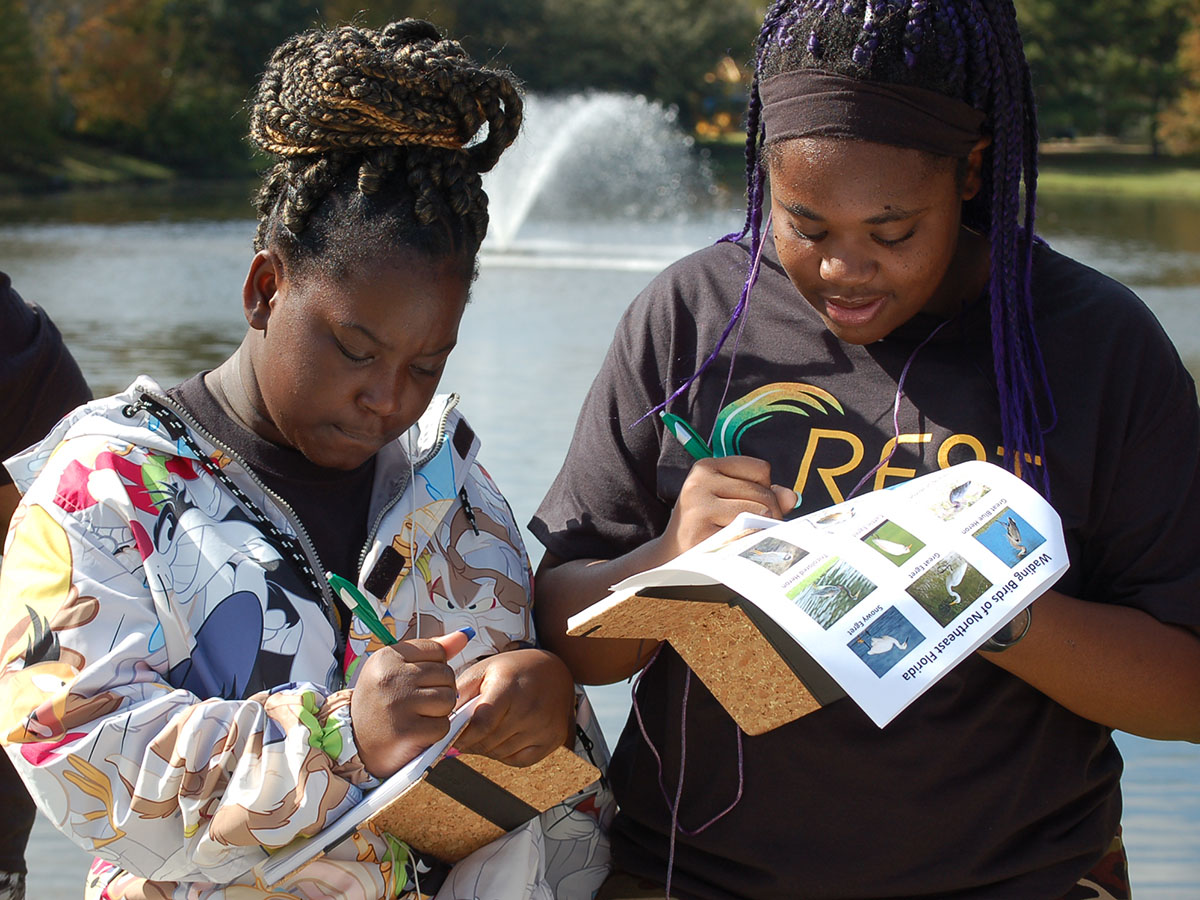 how to use binoculars and spotted twenty bird species during the bird walk, including an unexpected sighting of a Limpkin! how to use binoculars and spotted twenty bird species during the bird walk, including an unexpected sighting of a Limpkin!
According to Groundwork's Community Engagement Specialist Gloria McNair, the CREST program "works to build environmental stewardship and empower community leaders in our largely under-served urban core neighborhoods. During community engagement meetings, residents of the McCoys Creek area showed a strong interest in leadership, career, and educational opportunities for youth and adults. In response to this feedback, CREST was conceived and designed to help residents and other stakeholders of the community achieve some of their goals around personal and community growth."
This fall, chapter volunteers also gave presentations at two local garden clubs about backyard birds in the winter months as well as the best plants (native, of course) to attract and support birds, and led a special bird walk at our Crosby Sanctuary in Orange Park in partnership with the fine folks at the Argyle Forest Wild Birds Unlimited location.
We believe that those who appreciate the natural world around us will want to do what they can to preserve and protect it, and we are thankful for the opportunity to share our love of birds and nature with our community.
--Carol Bailey-White, Vice President
TIPS TO REDUCE YOUR PLASTIC FOOTPRINT
In response to the enormous amount of plastics being dumped into the ocean, landfills, waterways, and streets, and reports that we are constantly ingesting and breathing microplastics, Duval Audubon Society board member Carolyn Antman recently set about to severely reduce the amount of new plastic she uses in her daily life. Here is the first in a new series with ways you can help imperiled birds by reducing your plastic footprint:
"It took some effort in the way of research, changes in behavior, and self-restraint, but I am making progress. I hope that these monthly tips will make it easier for you to do the same.
We know that we should use reusable grocery bags at check-out, but many of us are still using the plastic bags provided by the grocer to sort our vegetables. Lightweight cloth bags that can be made from old sheets or pillowcases work just as well. They can be made in various sizes and are easily washable when needed. Here's how to make them.
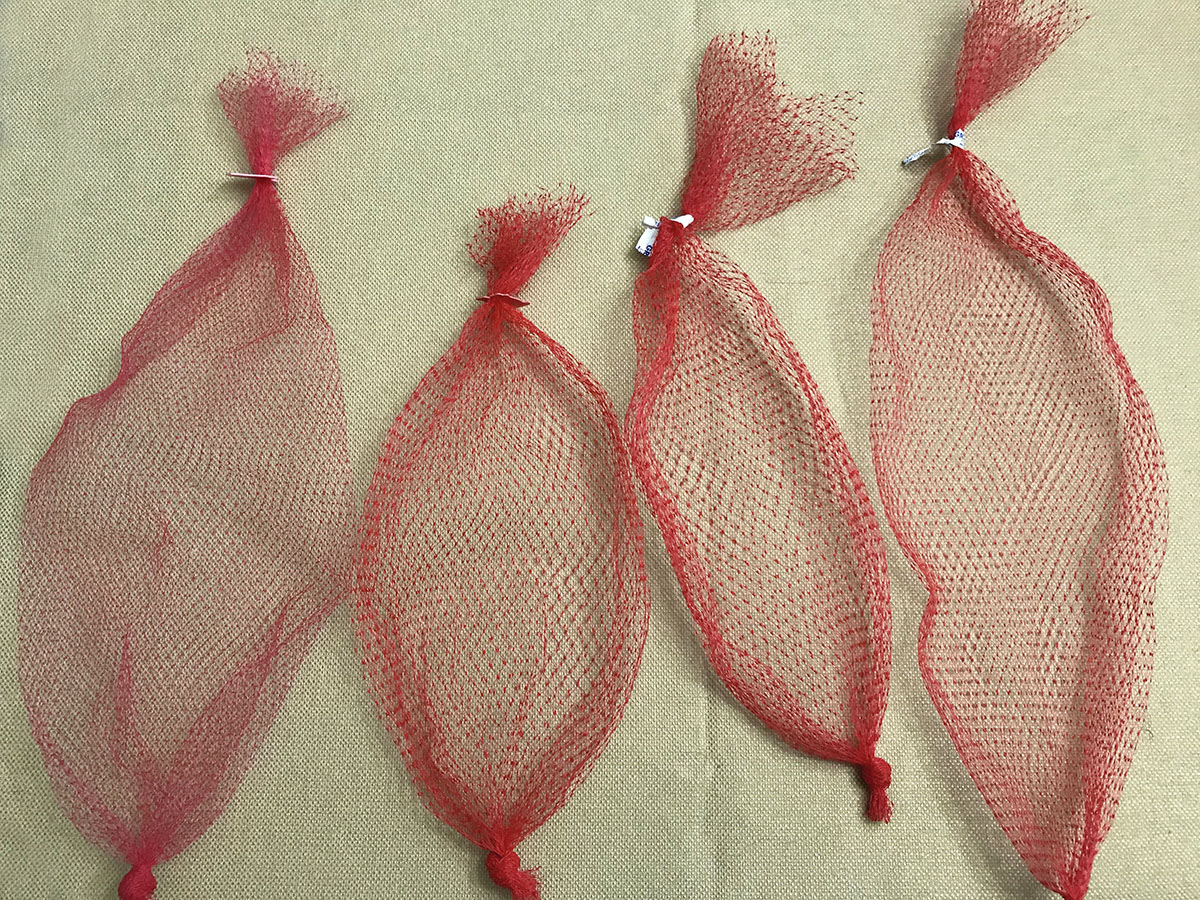 Also, I’ve accumulated a lot of the red, stretchy bags (left) that oranges often come in and these are very durable and can be re-used many times for this purpose. However, I won’t buy any more. Some produce, like grapes and berries, are almost impossible to find without plastic containers. The farmers’ market is about the only place I’ve found these loose. Also, I’ve accumulated a lot of the red, stretchy bags (left) that oranges often come in and these are very durable and can be re-used many times for this purpose. However, I won’t buy any more. Some produce, like grapes and berries, are almost impossible to find without plastic containers. The farmers’ market is about the only place I’ve found these loose.
Imagine if every day 10 million people refused two plastic bags (there are almost 330 million people in the US) that would be 20 MILLION bags A DAY not in circulation. That IS a difference, and we can make that difference one person at a time.
Your actions DO have an impact, so please choose to make your impact a positive one."
--Carolyn Antman, Conservation Chair
WHAT BIRDS MIGRATE TO FLORIDA IN WINTER?
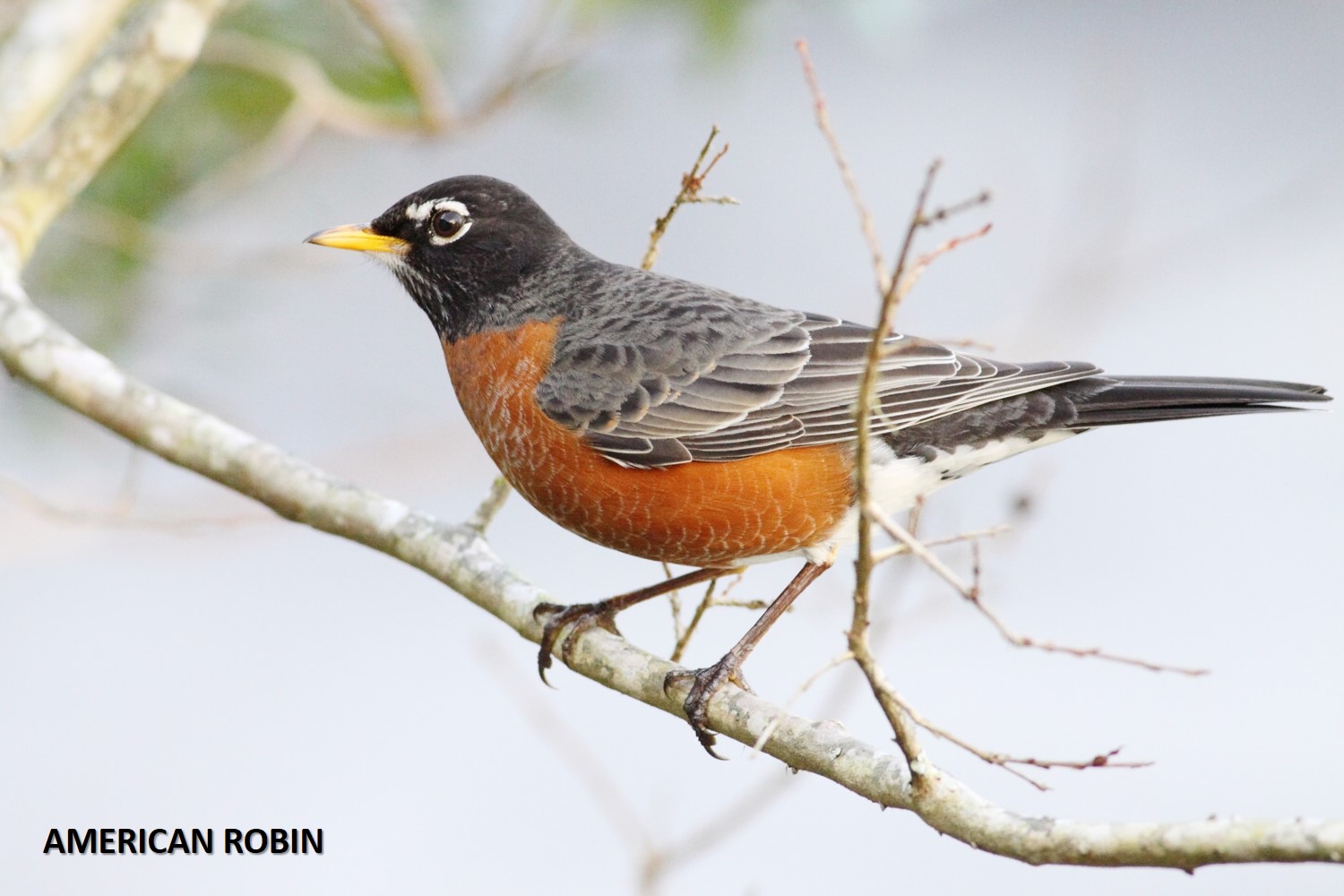 Winter brings snowbirds to Florida, and not just of the human species! “The highest diversity of wintering land birds can be found in the northern part of the state. Mourning Doves, Northern Cardinals, Blue Jays, Red-bellied Woodpeckers, Red-winged Blackbirds, and Common Grackles are common feeder birds throughout the state,” claims BirdWatchersDigest.com. Several species are known to nest and raise their young throughout Florida’s winter months, such as Bald Eagles, Great Horned Owls, and Ospreys. How lucky we are that migratory patterns guide everything from warblers to waterfowl and shorebirds to raptors (that suppress rodent populations) through Northeast Florida. Land species such as Eastern Phoebe, Hermit Thrush, Ruby-crowned Kinglet, American Robin, and Cedar Waxwing are common to our area in the winter months as well. To learn more about the types of birds that migrate either through or to Florida for the winter, check out this extensive list at OpticBird.org. Winter brings snowbirds to Florida, and not just of the human species! “The highest diversity of wintering land birds can be found in the northern part of the state. Mourning Doves, Northern Cardinals, Blue Jays, Red-bellied Woodpeckers, Red-winged Blackbirds, and Common Grackles are common feeder birds throughout the state,” claims BirdWatchersDigest.com. Several species are known to nest and raise their young throughout Florida’s winter months, such as Bald Eagles, Great Horned Owls, and Ospreys. How lucky we are that migratory patterns guide everything from warblers to waterfowl and shorebirds to raptors (that suppress rodent populations) through Northeast Florida. Land species such as Eastern Phoebe, Hermit Thrush, Ruby-crowned Kinglet, American Robin, and Cedar Waxwing are common to our area in the winter months as well. To learn more about the types of birds that migrate either through or to Florida for the winter, check out this extensive list at OpticBird.org.
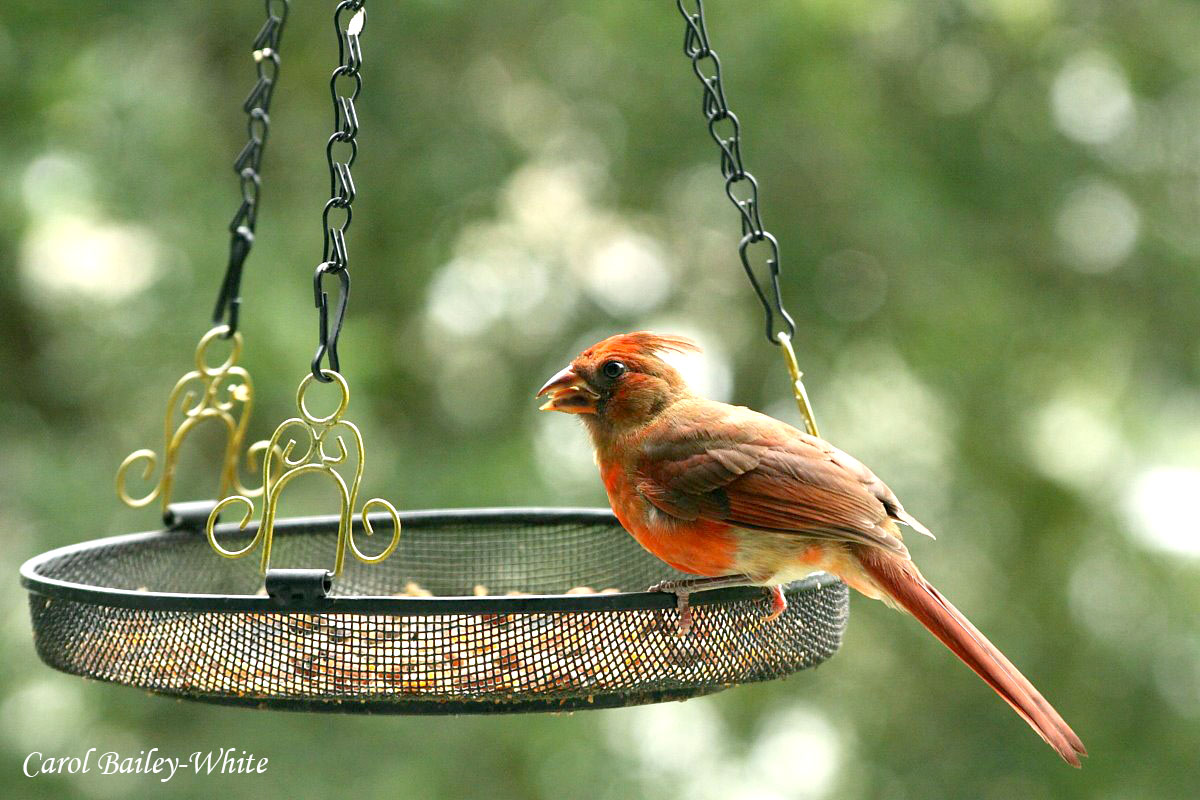 As we prepare for family gatherings and feasting this season, don’t forget to provide a delicious meal for our winged friends flying in from the north. According to AllAboutBirds.org, black oil sunflower seeds are high in protein and fats with a thin shell easy enough for most bird beaks to crack. Switch to striped sunflower seeds, which has a thicker shell, if you’re “inundated with species you’d rather not subsidize,” (like House Sparrows and European Starlings). Some seed mix has too much filler and may not be attracting the species you’d like to see in your backyard, so instead try safflower, which has a thick shell that’s hard for some birds to crack open but is a favorite among cardinals and finches. As we prepare for family gatherings and feasting this season, don’t forget to provide a delicious meal for our winged friends flying in from the north. According to AllAboutBirds.org, black oil sunflower seeds are high in protein and fats with a thin shell easy enough for most bird beaks to crack. Switch to striped sunflower seeds, which has a thicker shell, if you’re “inundated with species you’d rather not subsidize,” (like House Sparrows and European Starlings). Some seed mix has too much filler and may not be attracting the species you’d like to see in your backyard, so instead try safflower, which has a thick shell that’s hard for some birds to crack open but is a favorite among cardinals and finches.
Already feeding the locals and beyond? You’re impacting conservation in a big way, according to a study led by Virginia Tech, Cornell Lab of Ornithology and University of Georgia. “Looking at how humans react to and manage wildlife in their own backyards is very important for the future of wildlife conservation...” Read more at EurekAlert.org and use eBird to assist conservation efforts on a bigger scale.
Have questions or comments about a species or food type? Connect with us via our social channels or email. Duval Audubon Society is your connection to local and state birding.
Parents! Check out our Kids’ Corner:
By reading the linked articles highlighted above and pursuing hands-on projects (like feeding birds and watching backyard feeders) that answer this article’s focus question (what birds migrate to Florida in winter?), your child is working towards the following standards:
Reading Standards for Informational Text (RIT)
RIT-4. Determine the meaning of general academic and domain-specific words or phrases in a text relevant to a topic or subject area.
RIT-5. Compare and contrast the overall structure (e.g., chronology, comparison, cause/effect, problem/solution) of events, ideas, concepts, or information in two or more texts.
RIT-7. Draw on information from multiple print or digital sources, demonstrating the ability to locate an answer to a question quickly or to solve a problem efficiently.
RIT-9. Integrate information from several texts on the same topic in order to write or speak about the subject knowledgeably.
RIT-10. Read and comprehend informational texts, including history/social studies, science, and technical texts independently and proficiently.
Reading Standards: Foundational Skills (FS)
FS-3. Know and apply grade-level phonics and word analysis skills in decoding words.
FS-4. Read with sufficient accuracy and fluency to support comprehension.
Earth and Human Activity
ESS3-1. Obtain and combine information about ways individual communities use science ideas to protect the Earth’s resources and environment.
Life Science
LS2.A: Interdependent Relationships in Ecosystems. The food of almost any kind of animal can be traced back to plants. Organisms are related in food webs in which some animals eat plants for food and other animals eat the animals that eat plants. Organisms can survive only in environments in which their particular needs are met. A healthy ecosystem is one in which multiple species of different types are each able to meet their needs in a relatively stable web of life.
--Cristina Tuckness, Education Chair
UPCOMING EVENTS
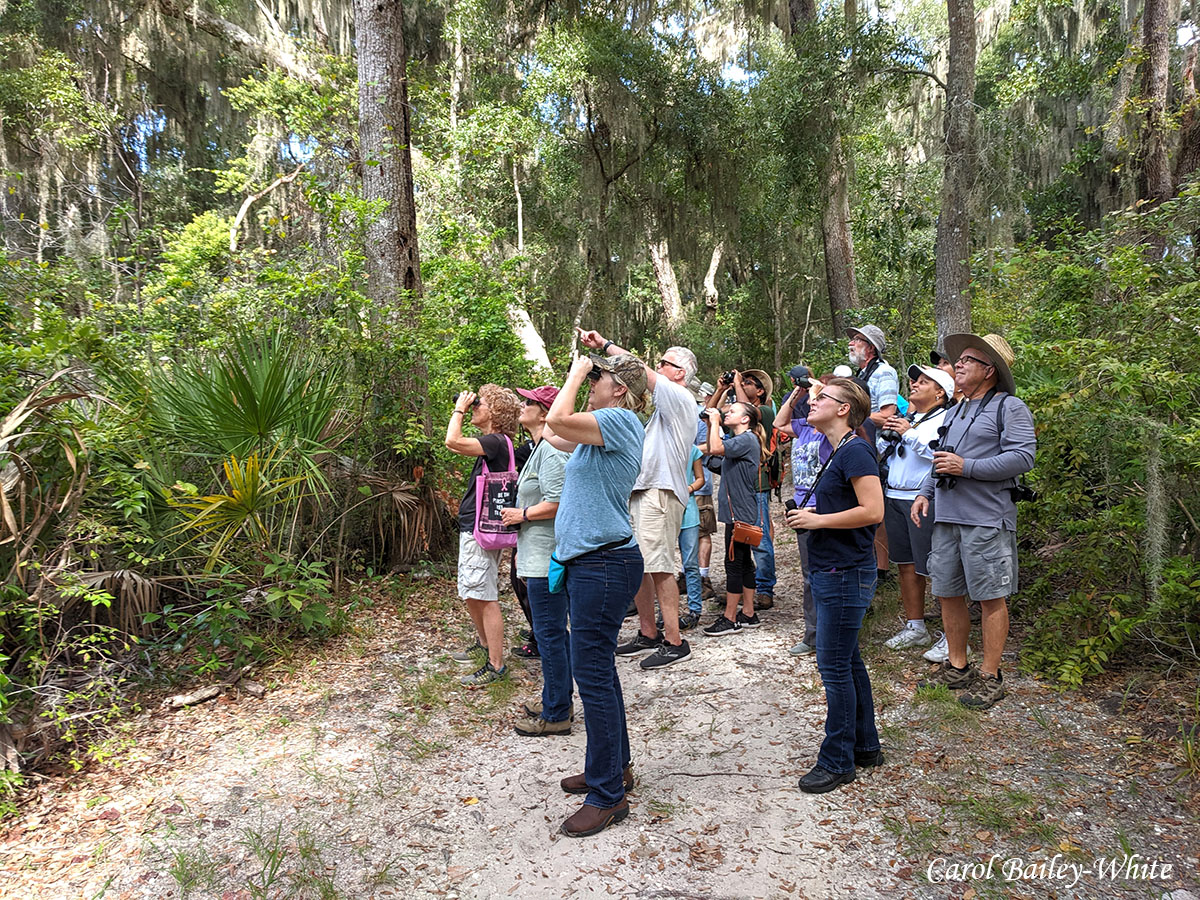 Our 2019/2020 season continues this month with more exciting activities. Please join us for one (or more) of our upcoming field trips or programs. Our 2019/2020 season continues this month with more exciting activities. Please join us for one (or more) of our upcoming field trips or programs.
- Bird Walk for Beginners: 10 am - 12 pm, Sunday, December 1, 2019 @ Fort Caroline National Memorial
- 6th Annual Christmas Bird Count for Kids (CBC4Kids): 9 am - 12 pm, Saturday, December 7, 2019 @ Camp Chowenwaw Park
- Little Talbot Island State Park Field Trip: 8-11 am, Sunday, December 8, 2019
- Taye Brown Regional Park Field Trip: 8-11 am, Saturday, December 14, 2019
- Monthly Program: The Biggest Week in American Birding: 6:30-8:30 pm, Monday, December 16, 2019 @ Lakewood Presbyterian Church
- PLEASE NOTE: NO Crosby Sanctuary Bird Walk & Work Day in December
Please, always check our website for any last-minute changes before heading out the door, just in case something has come up. We hope to see you soon!
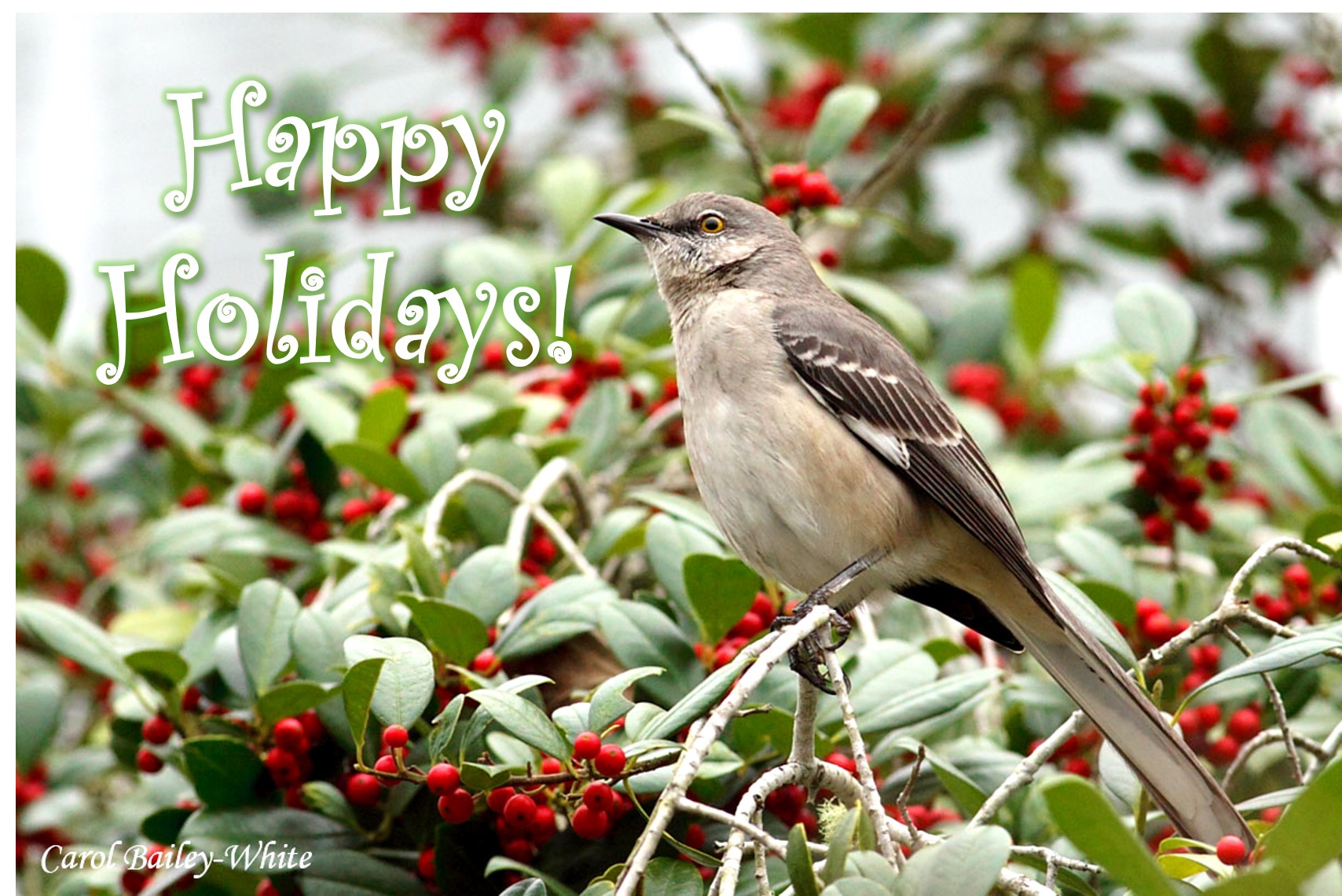
Best wishes for a joyous and BIRDY holiday season!
Duval Audubon Society, Inc.
P.O. Box 16304
Jacksonville, FL 32245
www.duvalaudubon.org
   
|

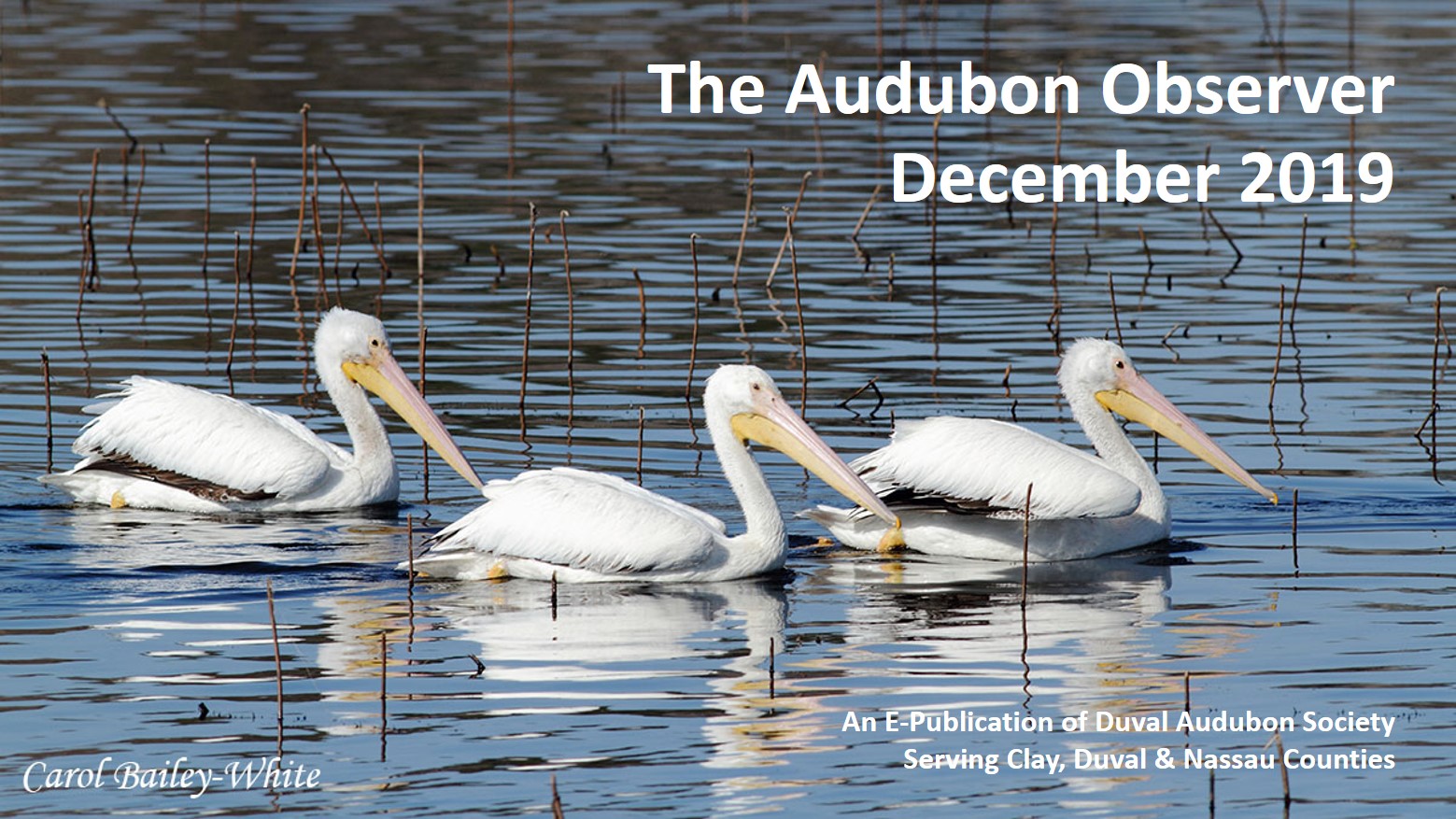
 Wild poinsettia is a native plant which grows in scattered locations from Florida to California, north to Virginia and across to Minnesota in the Midwest. It has many names, including painted leaf, fire on the mountain, painted spurge, and summer poinsettia among them. It is a relative of the showy Mexican poinsettia which everyone uses at Christmastime. The Mexican poinsettia was first brought to the United States by Joel Poinsett, U.S. Ambassador to Mexico from 1825-1829 as he admired the red and green plant. The rest is history.
Wild poinsettia is a native plant which grows in scattered locations from Florida to California, north to Virginia and across to Minnesota in the Midwest. It has many names, including painted leaf, fire on the mountain, painted spurge, and summer poinsettia among them. It is a relative of the showy Mexican poinsettia which everyone uses at Christmastime. The Mexican poinsettia was first brought to the United States by Joel Poinsett, U.S. Ambassador to Mexico from 1825-1829 as he admired the red and green plant. The rest is history. This fall we sponsored a bird-focused art installation and informational kiosk at
This fall we sponsored a bird-focused art installation and informational kiosk at  how to use binoculars and spotted twenty bird species during the bird walk, including an unexpected sighting of a
how to use binoculars and spotted twenty bird species during the bird walk, including an unexpected sighting of a  Also, I’ve accumulated a lot of the red, stretchy bags (left) that oranges often come in and these are very durable and can be re-used many times for this purpose. However, I won’t buy any more. Some produce, like grapes and berries, are almost impossible to find without plastic containers. The farmers’ market is about the only place I’ve found these loose.
Also, I’ve accumulated a lot of the red, stretchy bags (left) that oranges often come in and these are very durable and can be re-used many times for this purpose. However, I won’t buy any more. Some produce, like grapes and berries, are almost impossible to find without plastic containers. The farmers’ market is about the only place I’ve found these loose. Winter brings snowbirds to Florida, and not just of the human species! “The highest diversity of wintering land birds can be found in the northern part of the state. Mourning Doves, Northern Cardinals, Blue Jays, Red-bellied Woodpeckers, Red-winged Blackbirds, and Common Grackles are common feeder birds throughout the state,” claims
Winter brings snowbirds to Florida, and not just of the human species! “The highest diversity of wintering land birds can be found in the northern part of the state. Mourning Doves, Northern Cardinals, Blue Jays, Red-bellied Woodpeckers, Red-winged Blackbirds, and Common Grackles are common feeder birds throughout the state,” claims  As we prepare for family gatherings and feasting this season, don’t forget to provide a delicious meal for our winged friends flying in from the north. According to
As we prepare for family gatherings and feasting this season, don’t forget to provide a delicious meal for our winged friends flying in from the north. According to  Our 2019/2020 season continues this month with more exciting activities. Please join us for one (or more) of our upcoming field trips or programs.
Our 2019/2020 season continues this month with more exciting activities. Please join us for one (or more) of our upcoming field trips or programs.